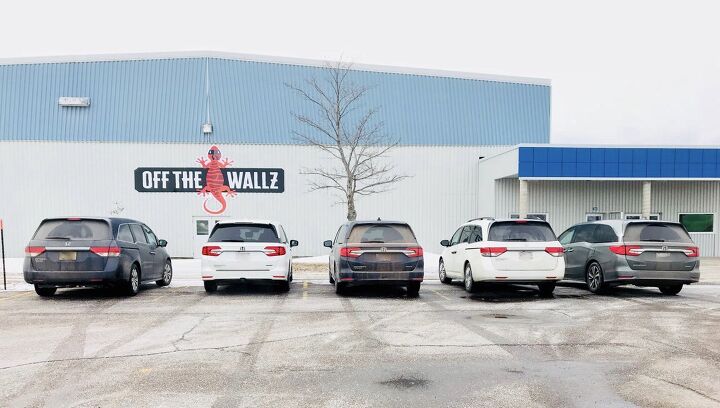End-of-term Report: 37,000 Miles and Three Years in a 2015 Honda Odyssey EX
We weren’t the typical minivan buyers. Yet with only one child (at the time), and desirous of full-size pickups, and frequent travellers of off-road paths not designed for an especially low-slung vehicle, we acquired a new 2015 Honda Odyssey EX in June 2015.
Three years and 37,000 miles later, after mountains of dog hair and many pounds of cracker crumbs and sand from a couple dozen beaches proved the merit of the OEM floor mats, our Odyssey’s odyssey is complete.
Do minivans still make sense in 2018? Do Odysseys hold up to the rigors of a young family’s life? And was it worth paying a premium for America’s favorite (retail) van?
Start by answering that last question. In Canada, the 2015 Honda Odyssey EX was a $37,195 van when new. Three years later, the Odyssey held strong with 67 percent of its original value. Our annual insurance costs were roughly $900. The van averaged 24 miles per gallon, better than the 20 mpg results on Fuelly but not surprising given the small percentage of time the van spent in urban settings. Our first service was free; we then spent around $650 on routine maintenance. The original Michelin Primacys called it quits after 15,000 miles. We replaced those and also added a set of Yokohama IceGuards that we’ve retained.
The kicker, of course, is that resale value. While the 2015 Odyssey EX – which sits above the LX and SE but below all leather-clad Odysseys – is now a $25,000 pre-owned van, there are similarly equipped 2015 Dodge Grand Caravan Crews with substantially less mileage listed for less than $17,000.
To be fair, the Odyssey’s resale value is built on a reputation for pristine Honda reliability that wasn’t entirely fulfilled in the real world. Front struts failed early. There was also work done to front brakes under warranty, corroded wheels replaced under warranty, and a failed integrated sunshade replaced under warranty.
On the flip side, the Odyssey runs, sounds, looks, feels (inside and out), handles, steers, and brakes like a new van. Indeed, it brakes better than it did originally.
As for the question of minivan sensibility in an SUV era, there was never any doubt in our minds that life with a large three-row crossover would have been complicated during this period in our lives. With a third row that was called upon weekly, at least, the ample cargo volume was truly a vital component. If you haven’t seen the number of Tonka tractors a 3-year-old boy can put in a wagon that must go to the beach, then you may not recognize the limitations of the nearly nonexistent cargo space behind the third row of most non-Suburban SUVs.
We tried to buy a roof rack when we acquired the Odyssey three years ago, since we already had a Thule rooftop carrier. The sales manager pleaded with us to save our money, saying, “You will not need it.”
He was right. We didn’t.
Flexibility is the name of the minivan game, so we frequently challenged the Odyssey to become a pickup truck, a rapid bladder transport vehicle for the I-need-to-pee toddler who should most definitely have gone before we left Grammie’s house, and a cross-province mile muncher with eight aboard.
There is no other vehicle that could even dream of accomplishing all of these divergent tasks: a Toyota Highlander can’t swallow this much stuff, a GMC Yukon XL can’t be hustled down a rural road this swiftly, and a Ford F-150 can’t carry this many people.
It’s also worth noting that the few vehicles that can come close to exhibiting the minivan’s well-roundedness do so at higher price points. Minivans aren’t for everybody all the time everywhere – I commute in a Miata, after all, and I spent much of the winter in a Nissan Armada.
But how do you argue with the minivan’s sheer functionality?
[Images: Timothy Cain/TTAC]
More by Timothy Cain
Latest Car Reviews
Read moreLatest Product Reviews
Read moreRecent Comments
- Carson D Just don't be the whistleblower who reports on the falsification of safety data. That's a deadly profession.
- Carson D I'd have responded sooner, but my computer locked up and I had to reboot it.
- Todd In Canada Mazda has a 3 year bumper to bumper & 5 year unlimited mileage drivetrain warranty. Mazdas are a DIY dream of high school auto mechanics 101 easy to work on reliable simplicity. IMO the Mazda is way better looking.
- Tane94 Blue Mini, love Minis because it's total custom ordering and the S has the BMW turbo engine.
- AZFelix What could possibly go wrong with putting your life in the robotic hands of precision crafted and expertly programmed machinery?





































Comments
Join the conversation
Is Honda's reputation for reliability deserved? My father's 2005 Accord has been his most unreliable vehicle he's owned. Constant issues involving vtech, ball joints, shocks, ignition system, cooling fan, batteries. My co-worker's '11 Oddy has also been a disaster wrt cooling system, A/C, and shocks. Plus, a high-speed shimmy that was never resolved by the dealer.
What's up with Michelin lately? I've got 88,000 miles on my 2015 Odyssey and still running the original Continental tires (tires have about 57,000 on them because the other miles were snow tires) 4/32 still. Weird. I bought my car for 6000 off sticker... The resale is absolutely incredible on these. I've literally spent more on fuel than the vehicle has depreciated.